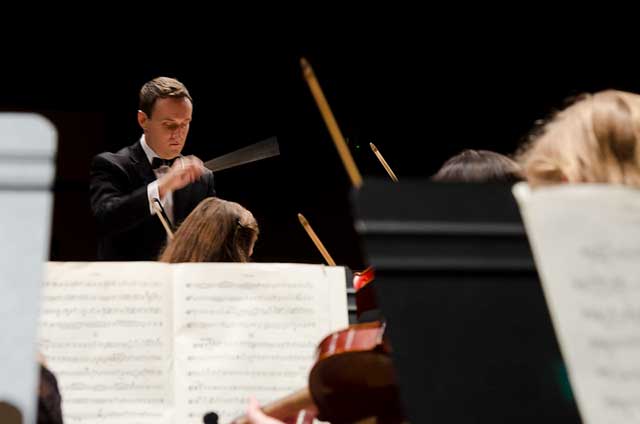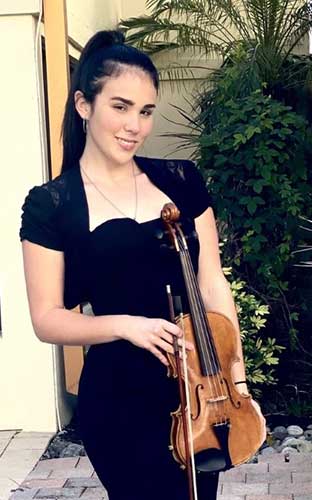Thanks to technology and the resourcefulness of faculty and students, Florida Gulf Coast University has done its best to continue its academic mission without missing a beat.
And during a time when the higher-education show must go on during seemingly endless isolation and anxiety, Dr. Kyle Szabo and his Bower School of Music students are perhaps better equipped than most to stay in tune, in rhythm, in symphonic harmony … whatever puns you want to use that symbolize the pleasant reality that their creation, exchange and development of orchestral music never stops, albeit from a distance.
Along with millions of other Americans, Szabo, director of orchestral studies and head of the string area for the Bower school, is working at home with his own kids for onsite entertainment, and virtually with his university “kids” – four violin students whom he mentors personally as part of their music performance degree program, along with other student musicians.

“Several are working toward major degree recitals and are preparing for graduate-school auditions as part of their curriculum,” said Szabo, who directs FGCU’s Symphony Orchestra and Chamber Strings ensemble. “The recordings are critiqued as part of the weekly lessons to improve their playing, but each lesson and recording is treated as a performance and taken as seriously as one on stage with a live audience.
“The students registered for Symphony Orchestra have assigned projects, such as orchestra excerpt recordings, and they meet with me and submit recordings less regularly,” he continued. “These excerpt recordings reproduce audition expectations with a professional or community orchestra.”
Szabo, who works with about 70 students in various classes, also has been advising and coaching former students and alumni who have reached out to him the past month. He has been able to do it all because the “tools we have available are incredible.”
“I’ve been working with these students in a typical face-to-face manner for some time at the university, as this is a core part of their major area of study,” Szabo said. “I have worked with many students online before, but not these FGCU music majors. This is the first time we are virtually interacting, although the infrastructure was already in place. We were able to transition with little difficulty.”
Not only was the transition easy, Szabo has discovered advantages to distance instruction that he plans to continue once campus life returns to normal.
“Students have to routinely record themselves. Performance majors will need to do this frequently for auditions and competitions, and it is not as easy as it seems to deal with technical issues in self-recording,” he said. “Additionally, the students will have assembled a variety of recordings for self-promotion. Several are already using these recordings in social-media posts to increase visibility.”
In the lessons, Szabo reviews the recordings and gives time-stamped comments. “I suggest to all students that they record themselves to review their strengths and areas of improvement, but now the students mustdo this,” he said. “Clicking a time-stamp is an easy way to watch an excerpt with a comment in hand. We will keep doing this even after we return to traditional, face-to-face instruction.”
He acknowledges there are negatives to working this way – students often don’t have access to the ideal equipment, internet connections are not always fast and reliable, and what he calls the “acoustic element that is lost, even with the best equipment.”
“All that being said, we make the situation work,” Szabo said. “Musicians are incredibly resourceful, and we often work in circumstances that are less than ideal. We get through it in spite of difficulties, and still produce expressive and inspiring work.”

One of those rising musicians with whom Szabo works is Sandra Escribano, a junior violinist majoring in music performance. While Escribano appreciates the opportunity to “keep learning andstay on track with our program of study, continue to develop our skills with the help of our professor, and stay motivated,” she also laments having to do so from a distance.
“Musicians need that face-to-face contact with professors, and also with our peers, to rehearse and to do concerts,” said Escribano, a native of Havana who graduated from Cuba’s Amadeo Roldan Conservatory in 2017 before coming to FGCU.
Szabo is just happy to be able to “continue instruction in a situation such as this, and still experience progress as teachers and students.”
“We could not have done this when I was in school. Instruction would have just ceased until all returned to normal,” he said. “Enduring this difficult situation is far easier knowing that we can continue moving forward with our work.”
And that work – in the form of some of the greatest, most beautiful music ever composed – is instrumental in doing more than fulfilling and inspiring just the music teacher and his students in these imperiled times.
“When we started all of this necessary online instruction, I received recordings from my students as part of their lessons. I thought the performances were very good, and worth sharing, so I shared them with my colleagues in the Bower school,” Szabo said. “They continued to share them with others, and so on. Musicians and artists need to share what they are doing, and difficult circumstances only stimulate creativity. Additionally, the community truly values what we produce, and I think the need for connecting through creativity is as crucial now as ever.”
And Szabo, although largely confined to his home with his family as he makes the best of the situation, already envisions a positive butterfly effect on the arts from all this.
“I have seen something truly remarkable in the media,” he said. “Alongside the daily reports about this pandemic are stories of creativity. Musicians and artists are coming up with interesting ideas and sharing them with the community. People everywhere are expressing concern for the arts, and consuming all that artists are making available with gratitude and support. I think this is optimistic for the arts. Our society, when faced with one of the most significant challenges we have ever experienced, put the arts out in front as the thing we hold dear. We need to remember this when we are on the other side of this crisis.
“For now, we as faculty and student artists are doing all we can — putting our work out there to uplift others.”
- Watch an ABC7 report about Szabo and his students
- Watch an online viola performance by FGCU music student Teal Vickery below: